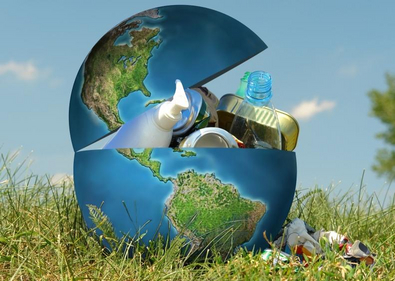Preview of the 8th Swiss Green Economy Symposium SGES
The SGES Symposium brings together decision-makers, implementers and innovators from business, politics, science and civil society who are concerned with sustainability or for whom these topics are becoming increasingly important. You are cordially invited to participate in the most comprehensive symposium for business and sustainability in Switzerland, the 8th Swiss Green Economy Symposium, on Tuesday, 01.09.2020 in Winterthur.

In 2020, the SGES will be held under the motto "Dialogue and obstinacy". Where do we need dialog, where do we need pioneers who 'simply' tackle sustainability - even if they choose unusual, even stubborn paths? How can we cleverly combine economic, social and ecological goals? Profit from the Success knowledge and the experience of over 150 personalities and experts. Be inspired among others by
- Prof. Dr. Kay W. Axhausen, Institute for Transport Planning and Systems ETH Zurich
- Rainer Baumann, Head of Department Technology, Information Technology & Logistics Migros-Genossenschafts-Bund
- Cristina Bueti, International Telecommunications Union UNO, Geneva
- Prof. Dr. Rainer Bunge, University of Applied Sciences Rapperswil
- Cédric Egger, Corporate Water Resources Manager Nestlé
- Annalise Eggimann, Director Innosuisse
- André Flückiger, CEO, Eicher+Pauli
- Kai Landwehr, Head of Marketing Myclimate
- Kurt Lanz Member of the Board of Economiesuisse
- Prof. Dr. Lorenz Hilty, Delegate for Sustainability University of Zurich
- Michael Künzle, Mayor of Winterthur
- Jack Mikkers, Mayor of 's-Hertogenbosch, Netherlands
- Government Councillor Dr. Martin Neukom
- Prof. Dr. Jean-Marc Piveteau, Rector ZHAW
- Jürg Röthlisberger, Director Federal Office for Road Traffic
- Barbara Schaffner, National Councillor
- Anna Schindler, Director Urban Development Zurich
- Hedda Samson, Ambassador of the Netherlands to Switzerland
- Dr. Karine Siegwart, Vice Director Federal Office for the Environment
- Gerold Schatt, Head of Sustainability Emmi Group
- Philipp Spaeti, CTO IBM Switzerland
- Christian Schultze-Wolters, Business Unit Manager Blockchain Solutions DACH BM
- Cantonal Government Councillor Carmen Walker Späh
- Christine Wiederkehr-Luther, Head of Sustainability Directorate, Federation of Migros Cooperatives
- Doris Wiederwald, AustriaTech Vienna
- Res Witschi, Delegate for Digitalization & Sustainability, Swisscom
Benefit from the comprehensive diversity at the SGES Symposium: Inspiring presentations, exciting panels, Innovation Exhibition and the Innovation Forums full interaction, e.g.:
IF.03 Areas lead into the future with Dr. Romeo Deplazes, Energie 360° AG; Fabian Etter, Swisscleantech; Daniel Trüssel, eicher+pauli; Patric Van der Haegen, Eberhard Unternehmungen; Dr. Christian Schmid, Intep; Moderation: Judit Solt, TEC 21 (Program, Registration)
IF.04 Autonomous Mobility with Anna Schindler, Stadt Entwicklung Zürich; Jürg Röthlisberger, ASTRA; Prof. Dr. Maike Scherrer, ZHAW; Thomas Küchler, Schweizerische Südostbahn; Janick Mischler, Die Post; Franz M. Rinderknecht, Rinspeed (Program, Registration)
IF.05 Effective Invest: New ways and market opportunities with Prof. Dr. Alexander Braun, University of St.Gallen; Sabine Döbeli, Swiss Sustainable Finance;
Lukas Schneller, SECO; Dr. Gunthard Niederbäumer, Swiss Insurance Association (Program, Registration)
IF.07 Sustainability communication including Till Berger, ARE; Andrea Hausmann, JTI; Manuela Huck-Wettstein, Sustainserv; Anna Peters, Migros-Genossenschafts-Bund; Dr. Moritz Reisser, BDO; Manuel Rotzinger, IKEA Switzerland; (Program, Registration)
IF.08 Smart Cities with Prof. Vicente Carabias, ZHAW / Smart City Winterthur; Urs Meuli, Federal Office of Energy; Stephan Grötzinger, City of Wil; Maarten Loeffen, Stadswerk Netherlands, Benjamin Szemkus, Smart City Hub; Hannes Treier, Myni Gmeind (Program 01.09 & 2.09, Registration),
IF.11 Global Value chains with Laura Tschümperlin, FOEN; Christian Ewert, Amfori; Nina Bachmann, Swiss Textiles (Program, Registration)
IF.12 Circular economy and plastics with Kurt Röschli, Kunststoff.Swiss; Prof. Dr. Rudolf Koopmans, Plastic Innovations Competence Center; Patrik Geisselhardt, Swiss Recycling; Christine-Wiederkehr-Luther, Migros (Program, Registration).
More Innovation Forums are
IF.01 Health
IF.02 Sustainable food systems (stakeholder dialogue).
IF.09 Energy & Climate
IF.10 Waste slags (stakeholder dialogue)
What is the benefit and what is the mood? Answers give the Statements former Speaker and the Mood film.
Place and date: Tuesday 01.09.2020, 08:30 - 17:30 at Theater Winterthur, from 17.30 networking aperitif until 19.00. The innovation exhibition will be open all day until 19.00. The second part of the Innovation Forum IF.08 Smart Cities will take place on September 2



















